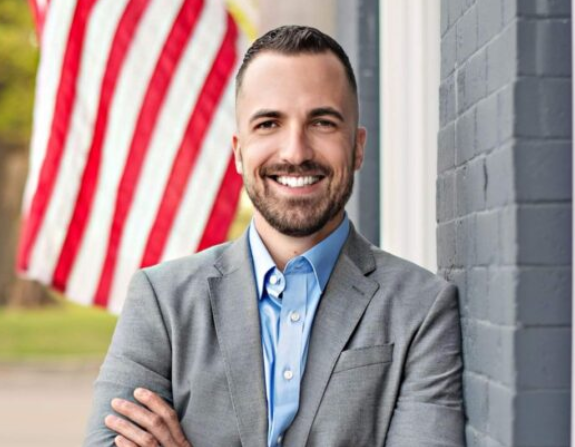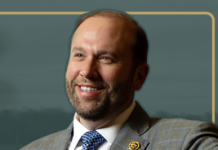Greetings Friends of the 155th District!
“This week in session has been both productive and enlightening. Members of the Board from White River Valley Electric visited to discuss the progress of fiber internet services in our district. The Branson Tri-Lakes Board of Realtors also provided valuable insights on protecting property owners’ rights, enhancing consumer protections, and promoting low-income housing tax credits. I was particularly pleased to welcome Matthew Lakey, the Vice President of our FFA Chapter, who came by for their Legislative Day, showcasing the importance of youth involvement in our civic processes. In addition, I enjoyed meeting David Easley and Aaron & Michelle Durso from Taneyville, along with their service dog Duke, to share our enthusiasm for driving business into our small towns, ensuring they have the financial resources for community improvements.
Building on these productive discussions, my office initiated preliminary talks with the railroad association regarding the feasibility of bringing short line rails into our district to make it more attractive for industry. Furthermore, the Missouri Geological Society visited to focus on the critical mineral potential in southern Missouri and the opportunities it may present for our region as more surveys are updated over the next few years. My office will continue to explore ever possible opportunities to drive business, economic growth, and job opportunities to our district.
Finally, I’m pleased to report that we successfully passed House Bill 68 out of the Commerce Committee, marking an important step toward creating a welcoming environment in our district and Missouri for economic growth and job creation by balancing the need for fair compensation with the promotion of fairness and efficiency in civil litigation. I look forward to our continued efforts to strengthen our community! As Robert Collier once said, “Success is the sum of small efforts, repeated day in and day out.”
Advancing Bold Tax Reforms
Missouri lawmakers are advancing key tax reforms to ease burdens on families and businesses while promoting economic growth. Several bills aim to lower or completely eliminate income taxes, phase out personal property taxes, incentivize investment in distressed areas, and streamline tax credits.
- HB 100: Establishes a flat 4% personal income tax starting in 2026, with potential gradual reductions if revenue conditions are met. It also removes income tax on earnings under $1,000 and repeals federal income tax deductions for individuals and corporations.
- HJR 1 and HJR 35: Propose a constitutional amendment to cap state spending based on population growth, create a Tax Reform Fund to phase out personal and corporate income taxes, and allow limited new sales taxes while capping the state rate at 3.775%.
- HB 988: Gradually reduces personal property tax rates, exempting farm machinery and motor vehicles, with full phase-out by 2036. Agricultural property assessments will rise from 12% to 15% in 2026.
- HB 1007: Restructures Missouri’s tax credit system, shifting administration to multiple agencies, setting expiration dates, imposing caps, and requiring fiscal offsets for new credits.
- HB 499: Establishes Earnings Tax Opportunity Zones in distressed communities, waiving local earnings taxes to encourage investment and job creation.
These reforms aim to return more money to Missourians, stimulate economic expansion, and create a fairer, more efficient tax structure.
Protecting the Unborn
The Missouri House continues to take decisive action in defending the right to life, advancing key pieces of legislation aimed at protecting the unborn and ensuring safeguards for children. This week, the House Committee on Children and Families and the Committee on Health and Mental Health held hearings on critical bills that reinforce Missouri’s commitment to life.
HJR 54 proposes a constitutional amendment banning most abortions, with exceptions for medical emergencies, fetal anomalies, rape, or incest. In cases of rape or incest, abortion must occur before 12 weeks, with law enforcement notified 48 hours prior. It also prohibits public funding for abortions and gender transition treatments for minors while allowing care for miscarriages, ectopic pregnancies, and emergencies. Violators face liability and medical license suspension.
The “Born-Alive Abortion Survivors Protection Act” (HB 195 and HB 1119) mandates medical care for any child born alive during an abortion attempt. Healthcare providers must ensure life-saving treatment and hospital transport, with penalties for noncompliance, including fines, imprisonment, or first-degree murder charges for intentional harm. The bill also allows civil lawsuits for wrongful death or injury related to unlawful abortions.
Protecting Our Children and Vulnerable Persons
The Children and Families Committee heard testimony on three bills focused on child safety, online protection, and the well-being of vulnerable individuals.
- HB 121 would establish the “Safe Place for Newborns Fund,” aimed at funding the installation of newborn safety incubators. These incubators serve as secure locations where parents in crisis can safely and anonymously surrender newborns, ensuring their protection and well-being, a result of legislation passed in 2021 to expand safe surrender options, potentially reducing instances of infant abandonment in unsafe conditions. In 2024, the first baby box was successfully used for a safe surrender, and additional boxes have since been installed. The initiative has received bipartisan support.
- HB 236 introduced new provisions regarding civil liability for individuals or entities that published or distributed material deemed harmful to minors on the internet. If passed, the legislation would have held content providers accountable for ensuring that minors did not access inappropriate materials online, potentially requiring stricter content filtering and age-verification measures.
- HB 219 would modify and establish provisions related to the protection of children and other vulnerable individuals. The bill aimed to enhance legal safeguards against abuse, neglect, and exploitation, strengthening enforcement mechanisms and protective services for those at risk.
Meanwhile, the House Committee on General Laws took up a legislative proposal seeking to strengthen the state’s laws against human and sex trafficking. HB 224 strengthens anti-trafficking efforts by establishing new committees, expanding training, and enhancing legal protections. It creates a new trafficking training committee and council under the Attorney General’s Office. The bill mandates training for key professionals, broadens victim protections, extends the trafficking statute of limitations to 20 years, and raises the child enticement age from under 15 to under 17. It introduces harsher penalties for patronizing trafficking victims, imposes restitution fees for survivors, and removes age limits for prostitution expungement.
Emphasizing Educational Standards and Student Accountability
The Missouri House Committee on Elementary and Secondary Education reviewed several proposed bills this week that would address various aspects of the state’s education system ranging from student performance assessments, technology use in schools, and educational access.
HB 712 introduces “Grade-level equivalence” as a standardized metric for assessing student performance and mandates its inclusion in school accountability reports starting in the 2026-27 academic year. The bill also eliminates inflationary increases for the minimum teacher salary and extends the authorization for retired teachers to substitute teach without affecting their retirement benefits until 2030.
HB 854 and HB 306 require schools to regulate student use of personal devices during class starting in 2026-27, while HB 408 mandates similar restrictions on phones and smartwatches in 2025-26. Exceptions apply for documented needs and health reasons. Policies must also cover non-instructional use, be publicly available, and outline disciplinary measures and liability protections.
Finally, HB 32 proposes lowering the minimum age for enrollment in adult high schools from 21 to 18, broadening access to education for younger individuals seeking alternative pathways to a diploma.
The committee deliberated on these proposals, which aim to improve student performance assessments, regulate classroom technology use, and expand educational opportunities.
Gender Transition Procedures and Participation in Sports
The House Committee on Emerging Issues convened on Monday for a more than 8-hour hearing to discuss legislation that supporters say will protect Missouri’s children from unnecessary and harmful sex change drugs and surgeries and promote fairness in competition and opportunity for female student athletes. The hearing examined seven bills related to these topics, with testimony being heard well into the night before wrapping up shortly before 12:45 a.m.
The hearing focused on four bills concerning gender transition procedures. HB 35, HB 1016, HB 1038, and HB 1081 propose modifications to existing laws on gender transition procedures. Currently, a health care provider must not knowingly prescribe or administer cross-sex hormones or puberty blocking drugs for the purpose of a gender transition for any individual under the age of 18. This bill specifies that after March 1, 2026, prescriptions for cross-sex hormones or puberty-blocking drugs that were given to individuals under 18 years old for the purpose of assisting the individual with a gender transition prior to August 28, 2023, will no longer be considered valid. These bills repeal the expiration clause.
Three other bills focused on the topic of transgender participation in athletic competitions. HB 36, HB 113, and HB 624 would modify the regulations governing participation in athletic competitions categorized by sex by again repealing the expiration clause. Currently, schools are only allowed to let a student compete in an athletic competition designated for the biological sex of the student, as stated on the student’s official birth certificate. The only exception is for female students, who may participate in competitions designated for male students if there is no corresponding athletic competitions designed for female students available. This provision is set to expire on August 28th, 2027.
Supporters cite medical and ethical concerns regarding minors undergoing gender transition and argue for fairness in sports. Opponents warn of restricted access to gender-affirming care and negative effects on transgender individuals.
The committee will review testimony and consider amendments before voting. If approved, the bills will move to the House floor and then to the Senate for further debate.
Child Care Expansion Moves Forward
This week, the Missouri House Economic Development Committee advanced HB 269, a bill aimed at improving child care access and affordability across the state. Set to take effect on January 1, 2026, this legislation introduces three tax credit programs designed to support families, employers, and childcare providers.
- Child Care Contribution Tax Credit Act – Allows taxpayers to claim up to 75% of contributions to childcare providers, capped at $200,000 per year, with a $20 million annual limit that can increase for contributions in underserved areas.
- Employer Provided Child Care Assistance Tax Credit Act – Grants businesses with at least two employees a 30% credit on qualified childcare expenses, up to $200,000 per year, prioritizing childcare deserts.
- Child Care Providers Tax Credit Act – Offers tax credits for employer withholding taxes and capital expenditures, up to $200,000 per provider annually, focusing on underserved areas.
These non-refundable, non-transferable tax credits have a $20 million annual cap, with a 15% increase if reached, and will expire December 31, 2031.
By advancing HB 269, lawmakers are investing in Missouri’s childcare system to expand access, support providers, and encourage employer involvement.
If you ever have, any questions or concerns feel free to call me at 573-751-2042 or email me at Matthew.Overcast@house.mo.gov. Our office is always here for you.







